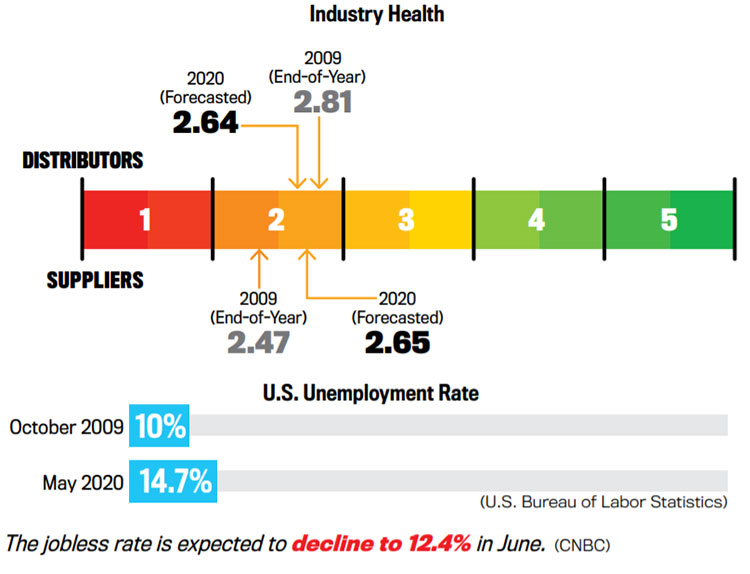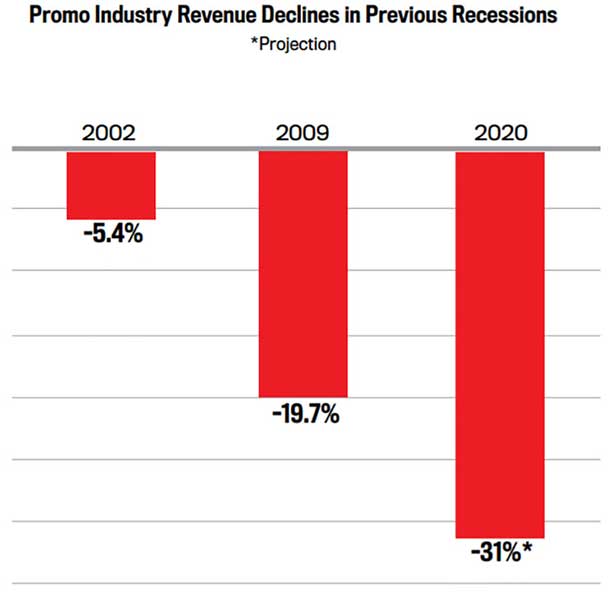Awards July 22, 2020
SOI 2020: Learning From the 2008 Recession
As the U.S. faces a recession, distributors are using the wisdom they gained from the last economic collapse.
Before 2008, Kent, WA-based Alliance Print & Promo (asi/117925) focused on just the first part of its name.
Don't Miss: More SOI 2020
Then the Great Recession hit, and companies slashed direct mail, brochures and other print collateral from their marketing budget. As his clients saved money by taking their print advertising online, owner John Anderson sought another revenue stream to keep his company alive. Having only dipped his toe into promotional products, the entrepreneur instantly dove in. “At the time, the marketing strategy was all about saving money,” Anderson says. “We would approach clients and look for ways they could save costs.”


A Tale of Two Recessions: The recession of 2008 and 2009 was so severe that it was called The Great Recession. But judging by the projected drop in industry health and revenue this year, as well the country’s unemployment rate, the coronavirus recession will surpass it in its negative impact on business and the economy.
Twelve years later, another recession has hit, unleashing new challenges on the industry. While the circumstances are undoubtedly different this time around (“In 2008, you could still go out and meet people,” says Anderson. “Now I can’t see anyone in person.”), certain common wisdom about surviving and thriving during a recession still applies. Many promo companies are using the lessons learned then to see them through this difficult time. Here are a few of the biggest ones.
Keep Prospecting: Without repeat business to rely on, prospecting is the go-to strategy when times are tough. One of the worst mistakes you can make as a salesperson is to let your pipeline run dry. That desperation, especially during an economic drought, compels many reps to go after any orders they can get, regardless of how thin the price margins will be.
Thanks to technological advancements, prospecting is much easier than it was in 2008. John King, owner of Snoqualmie, WA-based LogoMotions, has been building his digital presence during the pandemic. After all, potential customers will be more likely to respond and work with you if they see your personality, marketing campaigns and loyal following. “I’ve been updating my social media, website and prospecting list,” said King at the beginning of summer. “I’m not quite ready to plunge into pitches yet due to continued uncertainty, but I’ll be ready to roll when it feels right.”
Have a Diversified Client Base: Gaining new clients is important, but gaining a variety of clients is even more important during a recession. Avoid being too heavily weighted in any one industry or geographic area. Maintaining a presence in several markets will offset weakness in a struggling sector. “It’s the oldest lesson in the book: Don’t put all your eggs in one basket,” says Walter Kurt, owner of Houston-based Three K Consultants Inc. (asi/344461). “Even before the last recession, my client base was spread across different industries. Sure, I have clients and industries I enjoy working with and feel very comfortable in, but you have to diversify to stay afloat.”
Prioritize Relationships: Diversification of services is also vital. Being merely a promotional products salesperson can only take you so far, especially when companies are less likely to buy. You have to offer your clients more, become a consultant for all their needs. “Build those relationships,” Kurt says. “When your clients grow, you grow. If they’re hurting, use that relationship to help them rebuild their business. People will remember those who come to them trying to sell something during this time as opposed to just being there for somebody.”
Watch Your Finances: Boston-based Proforma Printing & Promotion (asi/300271) was one of the few promo firms to actually grow during the 2008 Great Recession due to handling the marketing campaign of a major tech corporation’s hugely successful product. Without that good fortune this time, the company is doing whatever it takes to weather the storm. “The most important thing is managing cash flow,” says John S. Resnick, partner of Proforma Printing & Promotion. “You have to be really smart about every dollar that goes out and how you’re utilizing it.”
Stay Aggressive: While most companies look toward trimming their workforce during a recession, Resnick has ramped up recruiting efforts, investing in his sales team. After all, you can’t prospect or diversify your client base without ambitious, creative and dedicated reps. “Middle-market companies with a lot of overhead or debt are having to let people go,” Resnick says. “People are looking for work and are more willing to take a commission-type role.”
Be Compassionate: King says the biggest lesson he learned from the 2008 recession is the importance of staying in contact with clients. Even though buying may be the furthest thing from their mind, you shouldn’t be. “My primary focus has been to craft the proper messaging with my clients around sensitivity and value,” King says. “I’ve shared things on social media like work-from-home tips and emailed clients just to ask how they’re doing. I also sent a nice blanket with a handwritten note to many, saying ‘We can all use some comfort during these challenging times. We appreciate your partnership.’ While it seems counterintuitive to spend marketing dollars during a downturn, our actions during this unique time reverberate more than ever. It’s a chance to forge deeper bonds and come out stronger.”
Markets to Target While
Social Distancing
Even after states reopen, social distancing measures are still being implemented as the world adjusts to the “new normal.” Distributors must adapt to these evolving consumer spending habits by targeting these thriving markets.
Delivery Service
Instead of flocking to stores, shoppers are turning to delivery services for their groceries, home appliances, clothing, birthday and holiday gifts, and other items. In order to meet the growing demand, delivery apps such as goPuff and Instacart are hiring thousands of workers, creating enormous opportunity for distributors to sell uniforms, corporate apparel and new-hire kits.
Telehealth
Fearful of being exposed to the coronavirus, people are avoiding hospitals, medical facilities and urgent care centers at all costs. Thus, telehealth companies that allow patients to see doctors or therapists via their computers or phones have become more popular, fueling an opportunity for self-care packages to be shipped to patients’ homes.
Drive-In Theaters
A blast from the past, drive-in theaters are experiencing a resurgence as families are eager to get out of the house while maintaining social distancing. Musical acts are even using them to hold concerts. There are still 305 active drive-in theaters in the country, according to the United Drive-In Theatre Owners Association.
Alcohol
Historically, alcohol has been one of the most resilient industries during recessions. With virtual happy hours replacing going out on the weekends, distributors should reach out to breweries and wineries offering branded flasks, growlers, straws, bottle openers and other boozy merch.
